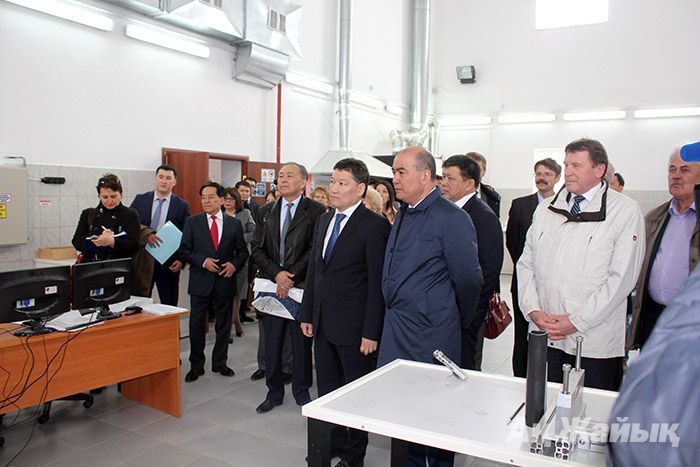 On April 13, the opening ceremony of the first in
On April 13, the opening ceremony of the first in
THE FIRST TASK OUT OF FOURTEEN
The project has been carried out within the framework of implementation of "Road map of Scientific and technological development of extracting sector of oil and gas industry of
"Road map …" was initially proposed by the Netherlands-British company "Shell" in December of 2009 at the meeting of Foreign Investors Council. During collaborative work with the Kazakhstan party 15 priority technological tasks has been identified, and common advantage from implementation of such tasks, in Shell's opinion, can be tens of billions of dollars.
The entire equipment of the geochemical laboratory was supplied and installed by Shell, and it became the first task solved. Nursultan Nazarbayev called other investors to implement the remaining 14 tasks.
At the opening ceremony the guests, mainly geologists and oil industry workers, were very excited. They noted that such laboratory doesn't have analogies in the countries of the former
– Of course, this is the basis for studying the core (the rock sample taken from a well). It is important for understanding what occurs down at the depth. If we don't confirm the geophysical surveys with a core, then they don't have any credibility. That is the position of the state commission on reserves (GKZ), – said one of the guests from Almaty.
According to Vice-Chairman of Shell in Kazakhstan Kuralbek Keldzhanov, now they have an opportunity to discover new hydrocarbon reserves and reduce the price of oil exploration activites by saving millions of dollars. Today to drill one well would cost from $20 to $200 million, and conducting geochemical analysis in the laboratory costs a few thousand dollars, that should allow to reduce drastically the construction scopes of exploration wells.
– By analyzing crude, it is possible to find new hydrocarbon reserves in our country. The principle of fingerprinting is used, i.e. dactyloscopy: it is possible to learn on a molecular level from which horizon, in what formations hydrocarbons are accumulated, - said K. Keldzhanov.
– It was repeatedly emphasized here that geochemistry is a new science in
- We selected the graduates from our universities who are specialized in "chemistry and biology" and retrained them into geochemists. This is a rather difficult process and we involved the experts from
– How many people will work in the geochemical laboratory and what is average salary?
- The staff will consist of 10 people in the laboratory. An average salary will be 120-150 thousand tenge. It is not very high, therefore it will be difficult to attract experienced and currently working experts from Karabatan.
Photos taken by the author
 В Атырау -10
В Атырау -10 

